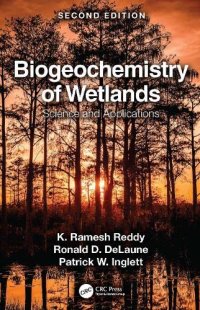
Ebook: Biogeochemistry of Wetlands: Science and Applications
The globally important nature of wetland ecosystems has led to their increased protection and restoration as well as their use in engineered systems. Underpinning the beneficial functions of wetlands are a unique suite of physical, chemical, and biological processes that regulate elemental cycling in soils and the water column. This book provides an in-depth coverage of these wetland biogeochemical processes related to the cycling of macroelements including carbon, nitrogen, phosphorus, and sulfur, secondary and trace elements, and toxic organic compounds.
In this synthesis, the authors combine more than 100 years of experience studying wetlands and biogeochemistry to look inside the black box of elemental transformations in wetland ecosystems. This new edition is updated throughout to include more topics and provide an integrated view of the coupled nature of biogeochemical cycles in wetland systems. The influence of the elemental cycles is discussed at a range of scales in the context of environmental change including climate, sea level rise, and water quality. Frequent examples of key methods and major case studies are also included to help the reader extend the basic theories for application in their own system. Some of the major topics discussed are:
- Flooded soil and sediment characteristics
- Aerobic-anaerobic interfaces
- Redox chemistry in flooded soil and sediment systems
- Anaerobic microbial metabolism
- Plant adaptations to reducing conditions
- Regulators of organic matter decomposition and accretion
- Major nutrient sources and sinks
- Greenhouse gas production and emission
- Elemental flux processes
- Remediation of contaminated soils and sediments
- Coupled C-N-P-S processes
- Consequences of environmental change in wetlands#
The book provides the foundation for a basic understanding of key biogeochemical processes and its applications to solve real world problems. It is detailed, but also assists the reader with box inserts, artfully designed diagrams, and summary tables all supported by numerous current references. This book is an excellent resource for senior undergraduates and graduate students studying ecosystem biogeochemistry with a focus in wetlands and aquatic systems.